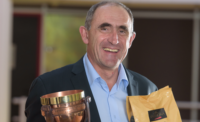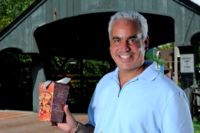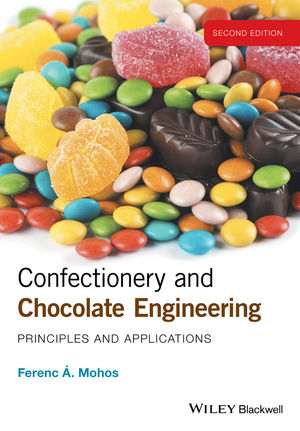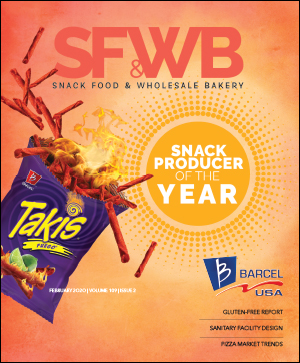
Arway Confections' front four (from l. to r.) in the company's facroty outlet shop.: Rick Johnson, general manager; Chris Perkins, sales manager; Craig Leva, co-owner and vice president; and James Resnick, co-owner and president.

Abraham Quecdas cleans off chocolate that's collected on one of the company's six automatic belt coaters.
Partnering with Leva, co-owner Jim Resnick has been with the company for more than 55 years. But it all started with Jim’s father.
“My father, Arthur Resnick, was a traveling salesman in the candy business,” he begins. In 1950, an opportunity arose to purchase confectionery company Sovereign Candy. “Sovereign Candy produced wonderful Chocolate Pecan Caramel Patties, but was struggling financially.” Resnick’s father along with a friend each put up $5,000, bought the company, and Arway Confections was born.
With an established network of customers from years in the brokerage business, the new company immediately began to market its product, and just so happened to impress a local candy buyer. Fortunately, the buyer was from Sears Roebuck & Co., who at the time was the nation’s largest retailer, and became Arway’s first customer.
The company quickly realized the formula for success; produce a good quality and consistent product, a competitive price, and dependable service to create a long-term and loyal customer base. In fact, the relationship with Sears lasted 40 years until Sears stopped selling confections.
With strategy in hand, the company began to grow, increasing both the number of products it offered as well as its customer base. In 1960, Arthur bought out his partner and moved the operation to its current Chicago location. In 1962, Arway purchased another building across the street. Years later the company had to rent 10,000 sq. ft. of storage space in the building next door.
While still in college, Jim played a key role by helping to design the layout for his father’s new factory, even though he was a political science major. Fast forward 30 years and Jim’s current partner, Leva, also happened to be a political science major. So how did two “poly sci” majors hook up and get involved in confectionery? Family had something to do with it.
As Leva was leaving for college, his mother married Jim. Leva never grew up with Jim or even lived under the same roof, but the two got along well and had mutual respect for each other. When Leva graduated from the University of Wisconsin, he began his search for a career. At the same time, Jim was searching for someone to help stir up some sales at Arway. Jim offered Leva a job, and he joined the company in 1991 as a salesman.

One of the company's most recent investments is a Hayssen form/fill/seal bagger, which allows Arway to meet customer demand for pre-bagged items.
Jim felt Leva would be a better salesperson if he better understood the factory and the manufacturing processes. “When Craig first came here, he was concentrating on sales, but I wanted him to get his hands dirty in the factory,” Jim says. “It took about a year, but I believe that made him a better sales person. It’s really important to have knowledge and a true understanding of what you are selling, and what you can and can not do.” As Leva learned more and more about the business, he was able to build up sales and the company steadily grew.
By the late 1990’s, Arway was strapped for space and capacity. Jim and Leva decided to take the next step and took the “Field of Dreams” story to heart: “If you build it, they will come.” “They” being increased sales in this case. And the tagline held true. In 2001, Arway purchased the building next to them, and in turn doubled their space to 75,000 sq. ft. They connected the two buildings to form one large building, and increased their capacities with additional equipment and warehouse space.
As Leva learned more about the industry, business continually grew and changed.
“When I started here, a good percentage of our business was packaged product under our brand,” Leva says. “The problem with being a packaged goods supplier is you either need to have a name brand, or you have to offer the cheapest price. We had neither one.” Instead, the company found its niche somewhere in the middle.
“Our product may not be the lowest or the highest priced, but it tastes great,” Leva says. “And at the end of the day, if we can sell a competitively priced product that our customer can make a profit on, and the consumer likes enough to repurchase, what more can you ask for?”

QA Supervisor Fernando Maldonado (background) checks on an operator preparing praline walnuts, which will be used in a trail mix.
“Purchasing commodities doesn’t necessarily mean that you’re buying it cheaper than everybody else,” Leva says. “What it really means is you’re at the very least buying it at the same level as everybody else. If you can buy something less expensively, then you definitely have a little bit of an advantage.” Buying commodities correctly has allowed Arway to offer its customers relatively stable prices on its products.
As the company’s primary salesman, Leva took on multiple responsibilities. In addition to selling product and buying commodities, he picked up supply chain logistics and production scheduling duties. A snowball effect began to take place as the company grew in customers and products each year.
Before Arway’s expansion into the third building, Leva purchased 20% of the business. In 2004, he bought another 60%. Jim remains an active partner, and still holds his role as president.
“I wore a lot of hats,” Leva says. “I was selling product, buying product, managing logistics, even answering the phone. But I was really doing a disservice [to the company], because as we started to get bigger, how could I really do all of these jobs well?”

After receiving a white chocolate bath on a Sollich enrober, the pretzels undergo cooling and then are conveyed to one of two bulk cartons positioned under the belt.
“It might be matching a product; it might be a certain spice or seasoning; it might be a certain look or a certain ingredient. Essentially it’s the customer giving us the information for something specific that they want, and then us going back and creating the product,” Perkins says.
Rick Johnson came on board as general manager in 2005 to handle most of the purchasing along with the production scheduling; making sure inventory is coming in on time; and doing rotation work. For 17 years, he worked with repacker/packager Warner Candy, which was where he first met Craig. With Johnson’s packaging background, Arway invested in a new, vertical form/fill/seal Hayssen bagging machine.
“There are a lot of marketing companies out there that don’t want to touch anything,” Perkins says. “They want you to make the candy, and put it in a final package for them.” Purchasing the new bagging machine gave Arway the ability to take its bulk product one step further, and offer custom packaging services.
But the bagging machine wasn’t the only equipment Arway invested in.
Over the last seven years, Craig & Jim have invested around $2 million in expansion projects. Some of the newer equipment includes four 50,000 lb. liquid chocolate storage tanks, six belt coaters, two enrobers, a drizzled pretzel line and a bagging machine. Currently the company is in the process of completing construction of a new polishing room.
As far as signature products, Arway’s pecan confections have been very successful, especially throughout the South. The company’s first product, Chocolate Pecan Caramel Patties, are still popular along with milk, white and dark chocolate covered pecans, honey-toasted pecans and praline pecans. In 2007, Arway produced more than 1.5 million pounds of candied pecan products.
Arway is also well-known for its White Christmas Tree-shaped pretzels, which are sprinkled with red and green sugar.
Arway manufactures a wide variety of bulk items including specialty products. Chocolate panned products make up about 40% of business, while enrobing is 30%, kettle-cooked products are 20% and roasting is 10%.
“People still like the basics: double-dipped peanuts, chocolate raisins and chocolate almonds,” Perkins says. Besides traditional products, Arway tracks trends they think will stick around. “Dark chocolate is definitely a trend we see that’s going to stay,” Perkins says. “There has also been a shift to higher quality products at retail.”
“I think we’re kind of this open palate,” Perkins says. “We’re not tied to our brand because our brand is bulk. One of our strengths is that we can basically make anything for anyone whether it’s enrobed or panned.”
That doesn’t preclude the company from getting its name out. As a supplier of bulk candy, Arway tried to create a “bulk” brand as much as they could by changing the design of their corrugated boxes. The white boxes feature red, green or blue colors with the bowtie Arway logo and animation to grab attention.
Arway’s minimum order is 500 pounds of assorted products. For companies wanting smaller amounts, however, Chicago Candy & Nut, a division of Arway that doubles as its outlet store, can help. This retail store handles smaller wholesale orders, samples and retail traffic. For a taste of Chicago chocolates, customers can walk right into the store and find all of Arway’s creations.
Such accessibility and accountability reflect how the company runs its business. For example, as many other companies grow, typically phone systems become automated and relationships become less personal.
“At the end of the day you need to be able to pick up the phone and talk to people,” Leva says. “You need to have a relationship with people…And it sounds so simple. It’s business 101, but today it’s Internet, it’s voicemail systems, it’s not my job, it’s not my department.” Arway will always offer that personal touch and provide timely service to appreciative customers, he asserts.
That policy may have something to do with its growth. Since the company’s expansion in 2001, business has tripled. “And we’ve been growing for 16 years straight,” Leva says.
“I’ve got a great core group with everybody working really well together,” Leva says. “Through everybody’s knowledge and everybody’s experience and know how, we’re able to do a lot more as a small group than a lot of companies do as a larger group. So for right now we’re just going to stay the course and continue to tend to the business-watch the top line, watch the bottom line, and try to be leaders in quality, friends to the industry, be honest business people, and see where it takes us.”
From branded to bulk
Having worked summers at Arway since he was 12 years old, it seemed natural for Jim Resnick to join the family business when he finished school. What was unusual is the fact Resnick-a political science major in college-took interest in manufacturing rather than marketing and sales.What was also unusual is that Resnick-upon taking over the company in the 1980's from his father-totally changed the company's course.
"When I bought the business we were making our own line of packaged goods that had our own brand name on them," Resnick says. He would bring products to companies that would say they loved the product, but then indicate the packaging needed to be bigger or smaller. The next year, Arway would bring the product in the new packaging and the company would change their mind about the size of the packaging again. "It was just another story and every year I'd throw out $50,000-$100,000 worth of packaging and I said if this goes on we're going to go out of business," Resnick says. "So I made the decision to quit the boxed goods line...and I decided maybe bulk is the way to go." The change to bulk secured Arway's future.
At a glance
Arway ConfectionsHeadquarters: Chicago
Sales:$20 to $25 million (Candy Industry estimate)
Employees:100-120 during fall/winter
Plant: 75,000 sq. ft.
Products: Chocolate-covered nuts and fruits, roasted nuts, malt balls, other various chocolate items.
Capacities:Panning, enrobing, open-fire copper kettle cooking, oil roasting, custom mixing.
Customers:Nut companies, gift packers, distributors, catalogs, baggers, fundraising, retail, private label, contract manufacturing.
Management team: Jim Resnick, president & co-owner; Craig Leva, vice president & co-owner; Rick Johnson, general manager; Chris Perkins, sales manager.








